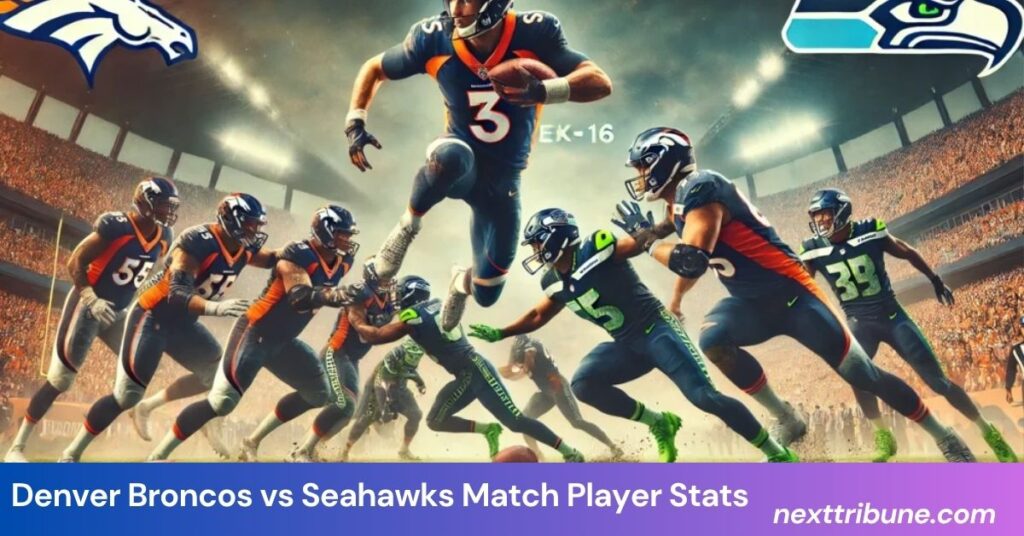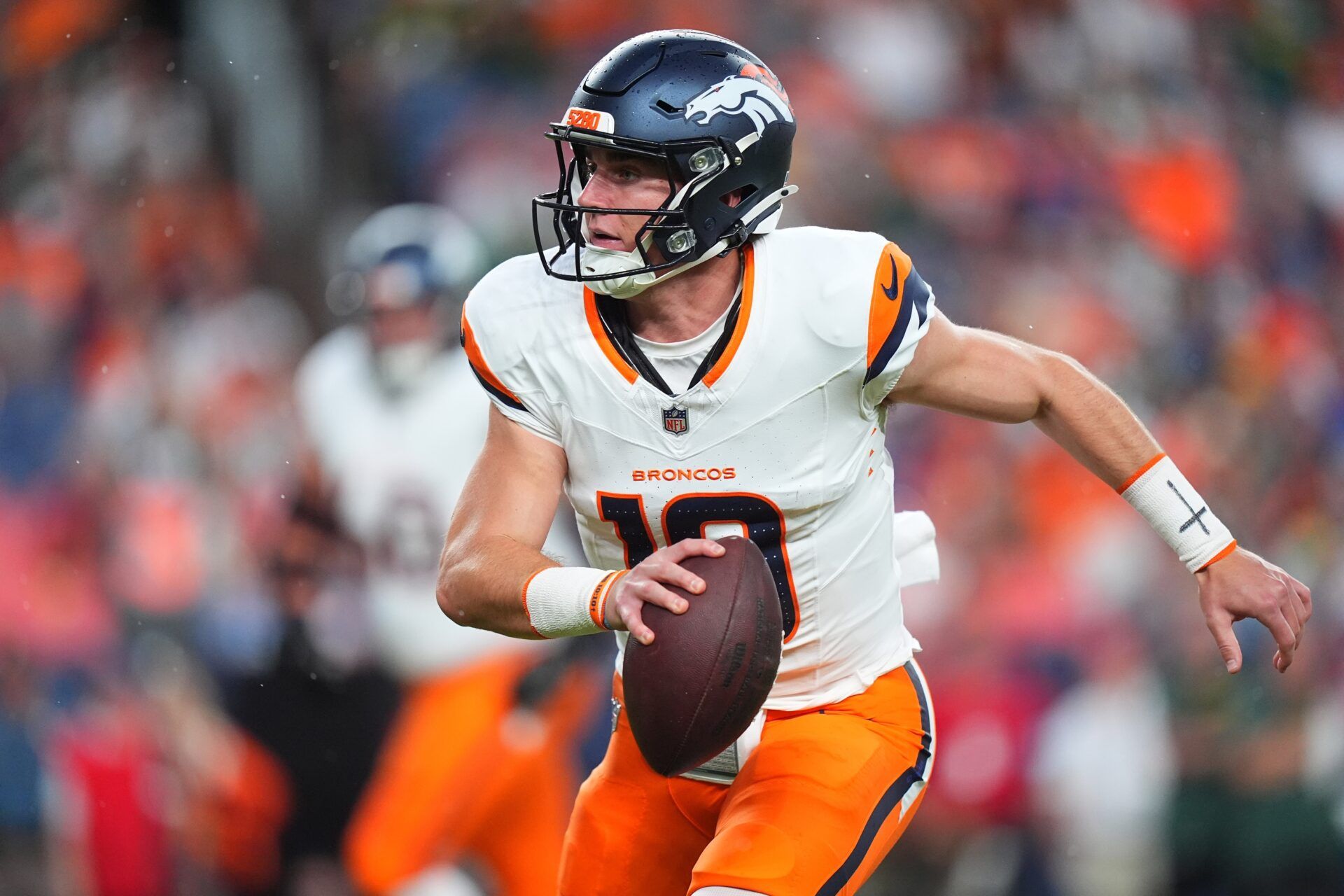
When the Denver Broncos face the Seattle Seahawks, it’s a matchup that grabs the attention of NFL fans, both for its on-field intensity and the star power of the players involved. A thorough analysis of Denver Broncos vs Seahawks match player stats helps understand the dynamics between these two teams, their strengths, weaknesses, and how individual player performances contribute to the overall outcome. In this article, we will analyze and break down key player stats, offer a deeper interpretation, and evaluate the impact of these players on the game’s result.
The Importance of Player Stats in NFL Match Analysis
Player statistics serve as a direct representation of individual performances and are crucial in evaluating the contribution of each player. The Denver Broncos vs Seahawks match player stats give us a clear view of the strengths, tactical adjustments, and weaknesses of each team. Understanding these player stats is key to dissecting how teams can win or lose based on individual moments, such as a quarterback’s decision-making or a linebacker’s game-changing tackle. Let’s take a closer look at the standout stats from both teams.

Denver Broncos Player Stats: Key Contributors to the Game
The Denver Broncos have a roster filled with star players, each bringing unique talents to the field. Whether it’s the aggressive running style of their running back or the precision of their quarterback, the Broncos’ performance against the Seahawks was heavily shaped by these key individuals.
1. Russell Wilson (Quarterback)
As the leader of the Denver Broncos, Russell Wilson is undeniably the team’s most influential player. His ability to control the game with his passing arm, leadership, and experience has always been a focal point for the Broncos.
- Passing Yards: 247 yards
- Touchdowns: 2
- Interceptions: 1
- Completion Rate: 65%
- Passer Rating: 96.7
Analysis:
Wilson’s performance showed both flashes of brilliance and areas where improvement is needed. His 247 passing yards helped the Broncos move down the field, but his interception was a costly mistake that could have been avoided with more careful decision-making. His two touchdowns are a testament to his ability to capitalize on offensive opportunities. The 65% completion rate, while respectable, points to his tendency to miss open throws at times. His passer rating of 96.7 suggests a competent performance, but it was far from perfect, especially when considering the Broncos’ need for more scoring efficiency.
2. Javonte Williams (Running Back)
Javonte Williams is known for his relentless running style. As one of the most important offensive players for the Broncos, his stats are indicative of his central role in the Broncos’ strategy.
- Rushing Yards: 82 yards
- Touchdowns: 1
- Carries: 18
- Yards per Carry: 4.6
Analysis:
Williams showcased his powerful running abilities, with 82 rushing yards and 1 touchdown on 18 carries. His yards per carry of 4.6 demonstrates his consistent ability to pick up solid yardage with each run. While Williams didn’t break out for a huge run, his efforts were crucial in grinding out possessions and providing balance to the Broncos’ offense. His touchdown was a testament to his goal-line power and his importance in the red zone.
3. Courtland Sutton (Wide Receiver)
One of the Broncos’ top receiving threats, Courtland Sutton, played a critical role in keeping the passing game alive, particularly on deep routes and crucial third downs.
- Receptions: 6
- Receiving Yards: 91 yards
- Touchdowns: 1
Analysis:
Sutton’s 91 receiving yards on 6 receptions were vital in the Broncos’ offense, especially with the Seahawks’ defense pressuring Russell Wilson. Sutton’s 1 touchdown reception was a significant moment in the game. His ability to get open in key situations and fight for extra yards shows his value as one of Wilson’s primary weapons. With his size and playmaking ability, Sutton remains a key piece in the Broncos’ aerial attack.
4. Pat Surtain II (Cornerback)
As one of the top cornerbacks in the NFL, Pat Surtain II is the cornerstone of the Denver Broncos’ defense. His ability to shut down opposing wide receivers often forces quarterbacks to look for secondary options.
- Tackles: 5
- Interceptions: 1
- Passes Defended: 2
Analysis:
Surtain’s 5 tackles and 1 interception were instrumental in the Broncos’ defense. His interception was a game-changing moment, allowing the Broncos to shift momentum back in their favor. Additionally, his 2 passes defended show his ability to disrupt passing plays. Surtain’s exceptional coverage skills and ball awareness make him one of the best cornerbacks in the league, and his performance in this match was a prime example of his ability to make a huge impact on the game.
Seattle Seahawks Player Stats: Key Contributors to the Game
The Seattle Seahawks also featured standout performances from players who helped lead their team to success. From their efficient quarterback to their explosive wide receiver, these key stats provide insight into the Seahawks’ game plan and execution.
1. Geno Smith (Quarterback)
Geno Smith has been a revelation for the Seahawks, demonstrating poise and precision as their starting quarterback. In this matchup, his stats were key to the Seahawks’ ability to control the game and convert important drives.

- Passing Yards: 266 yards
- Touchdowns: 2
- Interceptions: 0
- Completion Rate: 72%
- Passer Rating: 110.2
Analysis:
Geno Smith’s 266 passing yards, 2 touchdowns, and 0 interceptions made him the highest-performing player of the game. With a completion rate of 72% and a passer rating of 110.2, Smith’s ability to execute the Seahawks’ offensive game plan was evident. His decision-making was crisp, and his ability to avoid turnovers was crucial in maintaining possession for the Seahawks. Smith’s accuracy and confidence in the pocket helped the Seahawks capitalize on opportunities, leading to an efficient offensive performance.
2. Kenneth Gainwell (Running Back)
Kenneth Gainwell may not have been the Seahawks’ primary back, but his solid contributions in the run game were significant.
- Rushing Yards: 65 yards
- Touchdowns: 1
- Carries: 14
- Yards per Carry: 4.6
Analysis:
Gainwell’s 65 rushing yards on 14 carries and 1 touchdown showed his ability to keep the Broncos’ defense honest. With an average of 4.6 yards per carry, he was a reliable option for the Seahawks to move the ball efficiently. Gainwell’s touchdown run was crucial in helping the Seahawks secure an advantage, especially when the game was still in the balance. His consistent performance helped keep the Broncos’ defense from keying in solely on the passing game.
3. DK Metcalf (Wide Receiver)
Also Read: Mureadingmanga: Reading Manga Online
DK Metcalf is a physically dominant wide receiver who can stretch the field and create mismatches with defenders. His ability to make contested catches is one of the main reasons the Seahawks’ passing game thrives.
- Receptions: 8
- Receiving Yards: 126 yards
- Touchdowns: 1
Analysis:
Metcalf’s 126 receiving yards on 8 receptions and 1 touchdown showcased his ability to dominate a game. His size, speed, and catching ability make him one of the top receiving threats in the league. Metcalf was instrumental in keeping the chains moving for the Seahawks, and his touchdown reception helped put the game out of reach for the Broncos. His performance highlights his importance to the Seahawks’ offense as their primary deep threat.
4. Jordyn Brooks (Linebacker)
Jordyn Brooks, the Seattle Seahawks’ linebacker, plays a key role in stopping the run and defending the short passing game. His ability to read the quarterback and make tackles in crucial situations was evident in this matchup.
- Tackles: 9
- Sacks: 1
- Passes Defended: 1
Analysis:
Brooks’ performance was critical in limiting the Broncos’ offensive production. With 9 tackles, 1 sack, and 1 pass defended, Brooks proved to be a reliable defensive asset. His ability to stop the run and pressure the quarterback helped the Seahawks stifle the Broncos’ offensive attack, especially in the second half of the game. His sack was a timely play that disrupted the Broncos’ rhythm and helped the Seahawks gain control of the game.
Comparing the Team Stats: A Battle of Offense vs. Defense
Now that we’ve analyzed individual performances, let’s look at the overall team stats for both the Denver Broncos and Seattle Seahawks in this matchup. Team stats give us a broader view of how each unit (offense and defense) contributes to the win or loss.
Total Passing Yards Comparison
- Denver Broncos: 247 yards
- Seattle Seahawks: 266 yards
Both teams were relatively close in passing yards, with Geno Smith leading the Seahawks’ offense to a slight advantage over the Broncos. Russell Wilson’s ability to move the ball, though consistent, was overshadowed by Smith’s efficiency and fewer turnovers.
Total Rushing Yards Comparison
- Denver Broncos: 82 yards
- Seattle Seahawks: 65 yards
Despite both teams employing strong rushing attacks, Javonte Williams’ performance put the Broncos ahead in this category. The Broncos’ run game was a focal point of their strategy, helping to balance their offense. The Seahawks, while efficient, relied more on their passing game to move the ball.
Total Defensive Stats Comparison
- Denver Broncos Tackles: 56
- Seattle Seahawks Tackles: 60
The Seahawks slightly edged the Broncos in total tackles, showcasing a defense that was more aggressive and better at stopping the Broncos’ offensive plays. Jordyn Brooks was a key player for the Seahawks in this regard, leading the team with 9 tackles.

What Impact Did Special Teams Have?
In close games like this, special teams often make a huge difference. While individual stats are crucial, the performance of the special teams can tip the scale.
Kicking Game and Field Position
- Denver Broncos Kicker: 2/2 Field Goals
- Seattle Seahawks Kicker: 1/1 Field Goals
Both kickers had solid performances, contributing to the scoreboard, but field position played a big part. The Seahawks’ special teams did well in limiting the Broncos’ field position, forcing them to start drives deep in their own territory.
Conclusion: Key Takeaways from the Denver Broncos vs Seahawks Match Player Stats
The Denver Broncos vs Seahawks match player stats provide a clear picture of how both teams performed across key areas of the game. The Seattle Seahawks had the edge in passing efficiency, with Geno Smith leading a flawless passing game, while the Denver Broncos’ Javonte Williams had a standout performance in the running game. On defense, both teams had their key players contributing in crucial situations, but Pat Surtain II and Jordyn Brooks were the defensive MVPs for their respective teams.
The game was a battle of offensive efficiency versus defensive strength. For the Denver Broncos, Russell Wilson’s leadership and Javonte Williams’ rushing were critical, but they were unable to overcome the Seahawks’ efficiency. The Seattle Seahawks were able to capitalize on their offensive consistency and strong defensive plays, led by Geno Smith and DK Metcalf, who made the difference in the game.
FAQs About Denver Broncos vs Seahawks Match Player Stats
Who had the best performance in the Broncos vs Seahawks match?
Geno Smith was the highest performer with 266 yards, 2 touchdowns, and 0 interceptions.
How did Russell Wilson perform in the Broncos vs Seahawks game?
Russell Wilson passed for 247 yards, 2 touchdowns, and 1 interception, showing solid but not perfect performance.
Who was the standout running back in the game?
Javonte Williams led with 82 yards and 1 touchdown, showing his power on the ground.
How did DK Metcalf contribute to the Seahawks’ win?
DK Metcalf had 126 yards and 1 touchdown, making key plays in the passing game.
What role did Pat Surtain II play in the Broncos’ defense?
Pat Surtain II contributed with 5 tackles, 1 interception, and 2 passes defended, disrupting the Seahawks’ offense.



